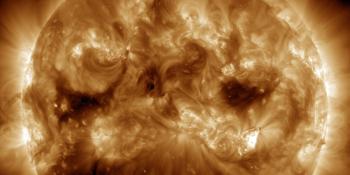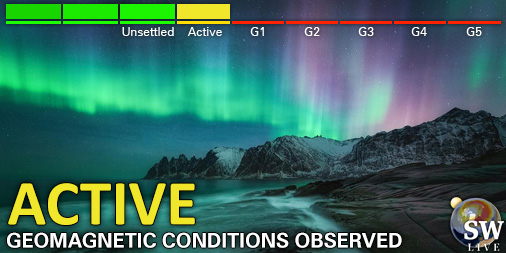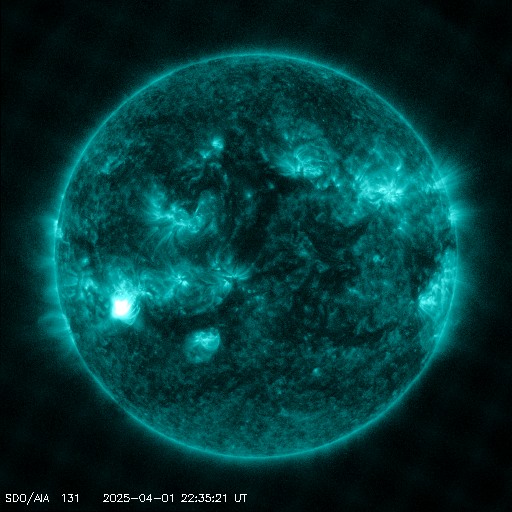Viewing archive of Sunday, 8 October 2023
Daily bulletin on solar and geomagnetic activity from the SIDC
Issued: 2023 Oct 08 1246 UTC
SIDC Forecast
Solar flares
C-class flares expected, (probability >=50%)
Geomagnetism
Quiet (A<20 and K<4)
Solar protons
Quiet
| 10cm flux | Ap | |
|---|---|---|
| 08 Oct 2023 | 157 | 007 |
| 09 Oct 2023 | 157 | 007 |
| 10 Oct 2023 | 157 | 007 |
Solar Active Regions and flaring
Solar flaring activity over the past 24 hours was moderate with one M-class flare and several C-class flares. The larger flare was the M1.8-class flare peaking at 18:06 UTC on Oct 7 occurring in the NOAA Active Region 3460. There are currently 9 numbered active regions with alpha or beta magnetic field configurations. The most complex regions are NOAA AR 3451 and NOAA AR 3452 (beta-gamma). The solar flaring activity is likely to be at low levels over the coming days with C-class flares expected especially from the NOAA AR 3451, NOAA AR 3452 and NOAA AR 3460, with a chance for isolated M-class flares and X-class flaring.
Coronal mass ejections
A C6.7-class flare peaking at 03:40 UTC on Oct 8 occurring in the NOAA Active Region 3460 was associate with Coronal Mass Ejection (CME). The CME was observed in SOHO/LASCO-C2 at 03:48 UTC. Based on the source location of the active region and the trajectory of the CME, no Earth-directed component is expected. No other Earth-directed Coronal Mass Ejections have been detected in the last 24 hours in the available SOHO/LASCO images.
Coronal holes
A large equatorial corona hole with a negative magnetic polarity has reached the central meridian today Oct 8.
Solar wind
In the last 24 hours, the solar wind conditions near Earth show a return to slow solar wind conditions. The solar wind speed had values varying between 295 km/s and 360 km/s. The total interplanetary magnetic field was below 6.0 nT. The Bz-component of the interplanetary magnetic showed mainly negative values with a minimum value of -5.4 nT. The solar wind is expected to remain at nominal conditions in the next 24 hours.
Geomagnetism
The geomagnetic conditions over the past 24 hours were quite with short period of unsettled condition visible locally (K Bel 1-3, Kp- NOAA 1-2). Quiet conditions are expected in the next 24 hours.
Proton flux levels
The greater than 10 MeV proton flux was at background levels over the last 24 hours. It is expected to mostly remain at background level, however possible rise of the proton flux cannot be fully excluded due to the current number of complex regions on the disc.
Electron fluxes at geostationary orbit
The greater than 2 MeV electron flux measured by GOES-16 was below the 1000 pfu threshold. The greater than 2 MeV electron flux is expected remains below the threshold in the next 24 hours. The 24h electron fluence was at normal levels and is expected to remain at normal levels in the next 24 hours.
Today's estimated international sunspot number (ISN): 148, based on 12 stations.Solar indices for 07 Oct 2023
| Wolf number Catania | /// |
| 10cm solar flux | 157 |
| AK Chambon La Forêt | 009 |
| AK Wingst | 004 |
| Estimated Ap | 003 |
| Estimated international sunspot number | 127 - Based on 25 stations |
Noticeable events summary
| Day | Begin | Max | End | Loc | Strength | OP | 10cm | Catania/NOAA | Radio burst types |
|---|---|---|---|---|---|---|---|---|---|
| 07 | 1757 | 1806 | 1810 | S10E39 | M1.7 | SB | --/3460 | III/1II/1 |
Provided by the Solar Influences Data analysis Center© - SIDC - Processed by SpaceWeatherLive
All times in UTC
Current data suggests there is a slight possibility for aurora to appear at the following high latitude regions in the near future
Yellowknife, NTLatest news
Latest forum messages
Support SpaceWeatherLive.com!
A lot of people come to SpaceWeatherLive to follow the Sun's activity or if there is aurora to be seen, but with more traffic comes higher server costs. Consider a donation if you enjoy SpaceWeatherLive so we can keep the website online!

Latest alerts
Wednesday, 2 April 2025
04:03 UTC - Hemispheric Power Index
The OVATION model predicts the Hemispheric Power Index to reach 50GW at 04:56 UTC
01:45 UTC - Geomagnetic activity
Active geomagnetic conditions (Kp4) Threshold Reached: 01:32 UTC
Tuesday, 1 April 2025
22:51 UTC - Solar flare
Moderate M2.5 flare
22:30 UTC - Radio Blackout
Minor R1 radio blackout in progress (≥M1 - current: M1.45)
07:15 UTC - 10cm Radio Burst
Begin Time: 01/04/2025 06:45 UTC Maximum Time: 01/04/2025 06:45 UTC Duration: 1 minutes. Peak flux: 190 sfu
Space weather facts
| Last X-flare | 2025/03/28 | X1.1 |
| Last M-flare | 2025/04/01 | M2.5 |
| Last geomagnetic storm | 2025/03/27 | Kp5 (G1) |
| Spotless days | |
|---|---|
| Last spotless day | 2022/06/08 |
| Monthly mean Sunspot Number | |
|---|---|
| February 2025 | 154.6 +17.6 |
| April 2025 | 152.5 -2.1 |
| Last 30 days | 130.7 -17.9 |




